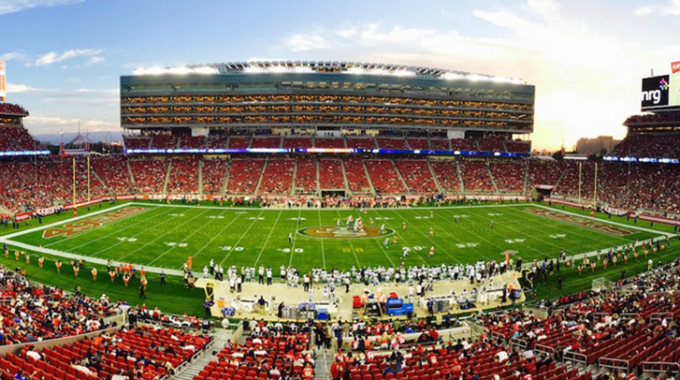How groups of Average Fans are blowing away ESPN
To get right to the point, I now have a perfect 8-0 record in betting on the NFL Playoffs. You can see where I’ve logged all of my picks for the Wildcard and Divisional rounds on this blog. And since you don’t know me, it’s worth pointing out that the remarkable thing about that number is that I’ve reached it without making a single decision on my own.
I’ve been making my predictions using a technology called Swarm Intelligence. It’s enabled by a software platform called UNU that allows large groups of fans to combine their knowledge and intuition in a real-time “swarm”. I know it sounds a bit strange, but so far it’s working really well for me. This is what it looks like when a group of people make a prediction as a swarm:

As I reported two weeks ago, I used the predictions made by UNU to bet on the Wildcard round, getting all 4 games right and producing a somewhat shocking 691% ROI. As you can see below, UNU’s returns dropped this week to a mere 332% ROI.

As I’ve said before, I’m not much of a gambler. So, I just placed a ceremonial bet to record UNU’s picks. But if I were more brave, I could have used last week’s winnings to bet on this week’s games and made some real money. How much?
To recap, I started with $20 and turned that into $158.24 using UNU. Had I bet that $158.24 on this week’s games in the same parlay fashion, I would have won $525.19, for a total payout of $683.43. In other words, I would have turned $20 into $683.43 in less than two weeks time.
Carry the one and you’ll see that listening to the Swarm intelligence produced a ridiculous 3,317% ROI.
Yes, more than a 33x return.
Still, many people think it’s “easy” to predict the winners of the NFL playoffs. So let’s take a closer look. If the games were random coin flips, a guesser would have a 1/256 chance of getting all 8 games correct. But we know there’s a wealth of information out there that should let us do far better than that. And no one has more information that the experts…right?
So, how do the experts do in picking games? Let’s see: ESPN EXPERT PICKS

Through 8-0 games, the UNU Swarm is beating 12 out of 13 experts. Only Merrill Hoge and ( perhaps not coincidentally ) SportsNation, are tied with with UNU’s perfect record. And take a closer look at Mike Ditka.
He gets paid millions of dollars to analyze football games, despite famously making one of the worst trades in NFL history. And despite his Hall of Fame career, his wealth of insider information, and it being “easy” to pick the winners, Ditka is doing somehow worse than a coin flip.
We’re not trying to pick on Ditka. Just the opposite. Picking winners is hard. That’s the point. All you need to do to convince yourself of that is to watch the games. Wild finishes, missed field goals, even controversial coin flips all conspire to make the NFL nearly impossible to predict.
So, why is the Swarm of average football fans so good? Or, why aren’t the experts better? One way to dismiss UNU’s 8-0 record is to say that the Swarm picks the favorites. But that’s not true, the Packers were slight underdogs on the road last week, and UNU predicted multiple upsets in the College Bowl Games. But the larger point remains that so-called experts like Mike Ditka might prefer to make riskier picks, which better demonstrate their knowledge of the game. In fact, Ditka guessed that 3 underdogs would win on the road in the Divisional Round. None of them did.
Which prompts the question: is trying to predict upsets smart? After all, isn’t the true test of knowledge making accurate predictions, not interesting ones? This is the theory behind a Wall Street Journal Article, “Football Forecasters Think Too Much.” As the article notes, the best way to make NFL predictions is not to ask an NFL “Expert” what he thinks will happen based on a thousand hours of game film, but rather to ask yourself a simple two-point question that’s become known as the Isaacson-Tarbell Postulate. Quoting academic Gregg Easterbrook:
“Here’s the beauty of the Isaacson-Tarbell Postulate: You don’t need incredible insider information, you don’t need to spend hours in fevered contemplation, you don’t even need to know who’s playing,” Mr. Easterbrook wrote. “Simply always check-mark the team with the best record, or, if their records are equal, check-mark the home team. Whatever you do, don’t think!”
Here’s the incredible thing about the simple Isaacson-Tarbell Postulate: no expert beats it. Just we’re seeing with human swarms, good-decision making doesn’t come from expertise, it comes from common sense.
What does this mean for Swarm Intelligence? In a sense, what we’re seeing is that thinking together is allowing groups of fans to better tap their common sense than the experts are able to do alone.
If you’d like to help us predict upcoming games, just fill out the form below. We’re looking for sports fans who want to help us keep kicking butt over at ESPN. The fact is, us fans – when thinking together – are smarter than the experts!
Add me to the list:




Pingback: 3 – How 75 Average Sports Fans Keep Beating the “Experts” at ESPN Picking NFL Games